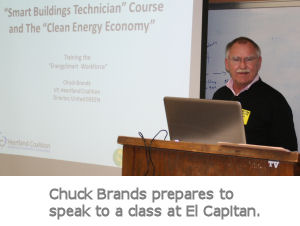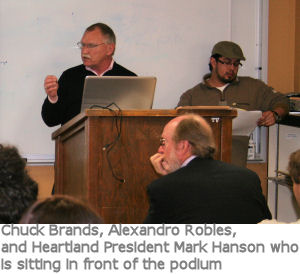
By Walt Meyer
February 19, 2013 (Lakeside)--New careers as the wave of the future was a key theme in a guest lecture February 12 given by Chuck Brands at El Capitan High School. Brands is a local sustainability and solar energy expert who is also vice-president of Heartland Coalition and director of its UnitedGREEN division.
Last fall, Brands coordinated a class at Southwestern College to teach a new technology that uses all relevant data to map a building so that owners and occupants can manage their energy consumption and plan to adapt the building for energy innovation. The students were team-taught this pioneering class by experts from across the country under a grant from SDG&E to the Heartland Coalition.
So that this learning didn’t place in a vacuum, part of the grant stipulated reports be made on the class and its ramifications to local high schools in hopes of inspiring students to pursue careers involving the energy technologies of the future.
Last month, Brands spoke to King-Chavez High School in downtown San Diego. That talk focused more on the new technology and the new careers that will be available through it. For his talk to Bob Schuldeis’ Economics class at El Capitan, Brands segued from the specifics of the Southwestern class “Smart Building Technician” to how climate change is impacting the economy and how along with the challenges it presents, the opportunities the changes will create in new jobs and new ways of looking at old problems.
He asked the students, “What is climate change costing you?” Then he laid out the impact that the burning of fossil fuels has not only on the environment, but the economy.
 The insurance costs of weather disasters hit an all-time high of $170 Billion last year and are expected to reach $1 trillion a year by 2025. As global warming intensifies, 100-year storms (meaning a storm this severe occurs on average once a century), are starting to happen every few years; costs of disasters such as Superstorm Sandy become immense. Meanwhile the government continues to subsidize inefficient fossil fuels and is moving toward allowing more gas and oil to be extracted rather than promoting the exploration and exploitation of renewable energy sources. When Brands asked the class what were the most common sources of renewables, they shouted out the right answers: “solar, wind and water.”
The insurance costs of weather disasters hit an all-time high of $170 Billion last year and are expected to reach $1 trillion a year by 2025. As global warming intensifies, 100-year storms (meaning a storm this severe occurs on average once a century), are starting to happen every few years; costs of disasters such as Superstorm Sandy become immense. Meanwhile the government continues to subsidize inefficient fossil fuels and is moving toward allowing more gas and oil to be extracted rather than promoting the exploration and exploitation of renewable energy sources. When Brands asked the class what were the most common sources of renewables, they shouted out the right answers: “solar, wind and water.”
Brands talked about how Germany is doing everything right in terms of promoting individual ownership of energy production—mainly with rooftop solar—and although California gets 70 percent more sunshine than Germany, which has the same latitude as Alaska, generates seven times the solar capacity of the entire US.
After Brands finished his presentation, one of the students from the SWC class, Alexandro Robles spoke about the ways students can reduce energy consumption by changing light bulbs, turning off unneeded electrical devices, and reducing the amount of time they run hair dryers and curling irons (both of which consume kilowatts at a high rate). Robles is also active in the MESA alliance at San Diego State, a group which promotes energy awareness.
Robles, like the rest of his clasmates from the Smart Building Technician class, remains involved and passionate about the topic. Although the students have completed the course and received their grades and certificates, they stay in touch and continue to work to finish mapping the Southwestern campus to be able to make recommendations in energy usage; a pilot program they hope will be emulated at other community colleges and other large institutions throughout the state.
The course teaches students to take advantage of information mash-ups to combine all possible data to make the best choice for energy design and consumption for building. Brands explain that the best examples of information mash-ups are travel sites like Travelocity which can pull in information from dozens of airlines, hotels and car rental companies to allow a consumer to make the best choice for their trip.
Brands spoke to two Economics classes at El Capitan and now is working to improve the Smart Building Technician class for its next session at SWC. He also seeks to replicate the course across California and the nation and plans to take advantage of technology to have his experts teach via video and stay in touch with their students via the Internet.











Recent comments